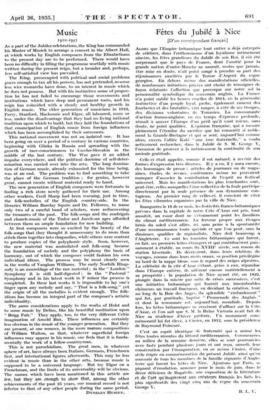Music
1910-1935 As a part of the Jubilee celebrations, the King has commanded his Master of Musick to arrange a concert in the Albert Hall, at which works by English composers from the Elizabethans to the present day are to be performed. There would have been no difficulty in filling the programme worthily with music written during the present reign,' but a broader and, perhaps, less self-satisfied view has prevailed.
The King, preoccupied with political and social problems grave enough to tax all his powers, has not pretended, as some less wise monarchs have done, to an interest in music which he does not possess. But with his instinctive sense of propor- tion he has not failed to encourage those movements and institutions which have deep and permanent roots, and his reign has coincided with a steady and healthy growth in English music. The elder generation of musicians in 1910, Parry, Stanford, Mackenzie and Elgar, all laboured, more or less, under the disadvantage that they had no living national tradition upon which to build, but they laid the foundations of that emancipation of English music from foreign influences which has been accomplished by their successors.
This national movement was not an isolated one. It has been going on over a period of a century in various countries, beginning with Glinka in Russia and spreading with the growth of race-consciousness to Czecho-Slovakia in the middle of the last century. The War gave it an added impulse everywhere, and the political doctrine of self-deter- mination was carried over into the arts. The long domina- tion of German music, already exhausted for the time being, was at an end. The problem was to find something to take the place of the German tradition ; for genius, however great, cannot create without material ready to hand.
The new generation of English composers were fortunate in finding a rich store newly gathered for their use. Among other workers, Cecil Sharp had been rescuing, just in time, the folk-melodies of the English country-side. In the libraries William Barclay Squire and Dr. Fellowes, to name only two of a careful band of scholars, were rediscovering the treasures of the past. The folk-songs and the madrigals and church-music of the Tudor and Jacobean ages afforded between them an ample foundation for new building.
At first composers were so excited by the beauty of the folk-songs that they thought it unnecessary to do more than stitch them together into rhapsodies, while others were content to produce copies of the polyphonic style. Soon, however, the new material was assimilated and folk-song became the foundation of melody and the polyphony the basis of harmony, out of which the composer could fashion his own individual idiom. The process may be most clearly seen in the works of Vaughan Williams. The early Norfolk Rhap- sody is an assemblage of the raw material ; in the " London " Symphony it 'is still half-digested ; in the " Pastoral " Symphony and in his latest work in F minor the process is completed. In these last works it is impossible to lay one's finger upon any melody and say, " That is a folk-song," yet the origin of all the melodies is evident enough. The folk- idiom has become an integral part of the composer's artistic individuality.
The *same considerations apply to the works of Hoist and to some music by Delius, like his beautiful meditation upon
Brigg Fair." " They apply, too, to the very different Celtic imagination of Arnold Bax. These influences are certainly less obvious in the music of the younger generation. But they are present, at one remove, in the more mature compositions of —William Walton, so that, whatever superficial foreign influences may appear in his music, one feels that it is funda- mentally the work of a fellow-countryman.
This is not parochialism. The great men, in whatever sphere of art, have always been Italians, Germans, Frenchmen first, and international figures afterwards. This may be less evident in music than in the other arts, because music is supposed- to be a. universal language.• But try Elgar on a Frenchman, and the limits of its universality-will be obvious. The names which have been mentioned in this article are
few, but they are enough to show that, among the other
achievements of the past 25 years, our musical record is not inferior to that of any other people during the same period.










































 Previous page
Previous page